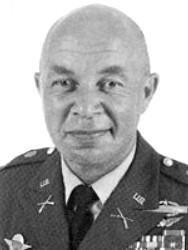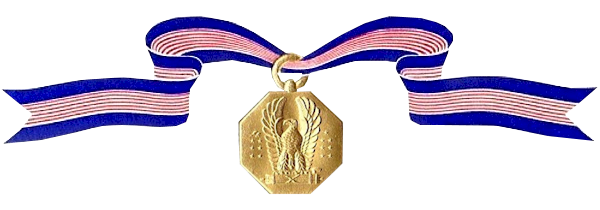Joseph Franklin graduated from the U.S. Military Academy at West Point, Class of 1950. He retired in 1980 as a U.S. Army Colonel.

–
Cemetery:
Awards Received
-

Legion of Merit
-

Legion of Merit
-

Legion of Merit
-

Legion of Merit
-

Silver Star
-

Soldier’s Medal
-

Distinguished Service Cross
-
Legion of Merit

United States Military Academy Register of Graduates(Citation Needed) – SYNOPSIS: The President of the United States of America, authorized by Act of Congress, 20 July 1942, takes pleasure in presenting a Third Bronze Oak Leaf Cluster in lieu of a Fourth Award of the Legion of Merit to Colonel (Infantry) Joseph Ross Franklin (ASN: 0-62893), United States Army, for exceptionally meritorious conduct in the performance of outstanding services to the Government of the United States as Deputy Commander, Fort Benning, Georgia, from 1975 to 1980. The singularly distinctive accomplishments of Colonel Franklin culminate a long and distinguished career in the service of his country and his dedicated contributions reflect the highest credit upon himself and the United States Army.
-
Legion of Merit
Service:
United States ArmyRank:
Lieutenant Colonel (Infantry)Action Date:
1968 – 1969
United States Military Academy Register of Graduates(Citation Needed) – SYNOPSIS: The President of the United States of America, authorized by Act of Congress, 20 July 1942, takes pleasure in presenting a Second Bronze Oak Leaf Cluster in lieu of a Third Award of the Legion of Merit to Lieutenant Colonel (Infantry) Joseph Ross Franklin (ASN: 0-62893), United States Army, for exceptionally meritorious conduct in the performance of outstanding services to the Government of the United States as a Battalion Commander in the 82d Airborne Division, and subsequently as Deputy Commanding Officer of the 173d Airborne Brigade, in action against the enemy in the Republic of Vietnam from 1968 to 1969. The singularly distinctive accomplishments of Colonel Franklin and his dedicated contributions in the service of his country reflect the highest credit upon himself and were in keeping with the highest traditions of the United States Army.
-
Legion of Merit
Service:
United States ArmyRank:
Lieutenant Colonel (Infantry)Action Date:
1964 – 1966
United States Military Academy Register of Graduates(Citation Needed) – SYNOPSIS: The President of the United States of America, authorized by Act of Congress, 20 July 1942, takes pleasure in presenting the Legion of Merit to Lieutenant Colonel (Infantry) Joseph Ross Franklin (ASN: 0-62893), United States Army, for exceptionally meritorious conduct in the performance of outstanding services to the Government of the United States as Army Attach to the Congo from 1964 to 1966. The singularly distinctive accomplishments of Colonel Franklin and his dedicated contributions in the service of his country reflect the highest credit upon himself and were in keeping with the highest traditions of the United States Army.
-
Legion of Merit
Service:
United States ArmyRank:
Lieutenant Colonel (Infantry)Action Date:
1968 – 1969
United States Military Academy Register of Graduates(Citation Needed) – SYNOPSIS: The President of the United States of America, authorized by Act of Congress, 20 July 1942, takes pleasure in presenting a Bronze Oak Leaf Cluster in lieu of a Second Award of the Legion of Merit to Lieutenant Colonel (Infantry) Joseph Ross Franklin (ASN: 0-62893), United States Army, for exceptionally meritorious conduct in the performance of outstanding services to the Government of the United States as a Battalion Commander in the 82d Airborne Division, and subsequently as Deputy Commanding Officer of the 173d Airborne Brigade, in action against the enemy in the Republic of Vietnam from 1968 to 1969. The singularly distinctive accomplishments of Colonel Franklin and his dedicated contributions in the service of his country reflect the highest credit upon himself and were in keeping with the highest traditions of the United States Army.
-
Silver Star
Service:
United States ArmyRank:
Colonel (Infantry)Division:
IV CorpsAction Date:
May 25, 1972
Headquarters, III Regional Assistance Command, General Orders No. 120 (June 4, 1972)The President of the United States of America, authorized by Act of Congress July 9, 1918 (amended by an act of July 25, 1963), takes pleasure in presenting the Silver Star to Colonel (Infantry) Joseph Ross Franklin (ASN: 0-62893), United States Army, for gallantry in action on 25 May 1972, while serving as Senior Advisor, 21st Infantry Division, Army of the Republic of Vietnam. On this date during the campaign to clear Highway 13 to relieve An Loc, Colonel Franklin, on one of his frequent visits to the area of greatest enemy resistance, moved to the 1st Battalion, 32d Regiment. The battalion was the lead element facing two NVA battalions and was under intense automatic weapons, B-40 wire-guided missile, 122-mm. rocket and 120-mm mortar fire when he arrived. A rocket struck ten feet from him wounding the battalion advisor who had been directing air strikes against the enemy. Colonel Franklin without regard for his own safety under fire moved immediately to render first aid to the advisor until an ARVN medic arrived. He then took over direction of Air Strikes, remaining in an exposed position to best observe the nearby enemy fortifications and direct the strikes. After requesting a helicopter to evacuate the wounded advisor, he selected a landing zone and guided the helicopter’s approach. A few seconds after the aircraft touched down an enemy mortar impacted 15 feet from it. Remaining on the landing zone, exposed to the enemy fire, Colonel Franklin attempted to load a stretcher bearing an ARVN soldier onto the helicopter while it was ascending. As the aircraft rose from the landing zone, the helpless wounded ARVN soldier fell from the helicopter and would have been re-injured but Colonel Franklin caught him breaking his fall. He then moved the wounded soldier to a more secure area while intense mortar and rocket fire continued. Colonel Franklin’s conspicuous gallantry in action was in keeping with the highest traditions of the United States Army and reflects great credit upon himself and the military service.
-
Soldier’s Medal

Headquarters, III Regional Assistance Command, General Orders (July 8, 1972)The President of the United States of America, authorized by Act of Congress, July 2, 1926, takes pleasure in presenting the Soldier’s Medal to Colonel (Infantry) Joseph Ross Franklin (ASN: 0-62893), United States Army, for heroism at the risk of life not involving conflict with an armed enemy. Colonel Franklin distinguished himself by heroic action on 16 April 1972, while serving as Senior Advisor, Advisory Team 51, United States Military Assistance Command, Republic of Vietnam. On this date, at approximately 1245 hours, an enemy 122-mm. rocket hit the Lai Khe ammunition dump containing seven hundred tons of artillery ammunition resulting in continuous series of up to 80 explosions per minute for several hours of 155-mm. shells which were hurled over 1,000 meters. Realizing the essentiality of preserving the POL point located 100 meters from the ammunition dump and vitally needed for relief of An Loc and support of friendly troops engaged against elements of three North Vietnamese Army divisions, Colonel Franklin voluntarily led a PA&E fire truck to the POL point despite the constantly exploding shells and fragments. Placing himself several feet between 100,000 gallons of POL behind a parapet he watched with fire fighting equipment for burning fragments around the POL. He was continually showered by shell fragments which covered the ground for literally thousands of square feet. Despite the imminent danger of one of the fragments or shells hitting the POL tanks which could have resulted in his being instantly incinerated, Colonel Franklin continued his fire watch until the explosion subsided and he was replaced by ARVN soldiers. Under fire resembling a heavy artillery concentration for several hours, Colonel Franklin’s heroic actions at great risk of loss of his own life helped preserve a vital POL point at a critical time in the battle for An Loc and contributed significantly to the results achieved. Colonel Franklin’s heroic actions were in keeping with the highest traditions of the military service and reflect great credit upon himself, his unit, and the United States Army.
-
Distinguished Service Cross
Service:
United States ArmyRank:
First Lieutenant (Infantry)Regiment:
7th Infantry RegimentDivision:
3d Infantry DivisionAction Date:
July 6, 1952
Headquarters, EIGHTH U.S. Army, Korea, General Orders No. 141 (January 24, 1953)The President of the United States of America, under the provisions of the Act of Congress approved July 9, 1918, takes pleasure in presenting the Distinguished Service Cross to First Lieutenant (Infantry) Joseph Ross Franklin (ASN: 0-62893), United States Army, for extraordinary heroism in connection with military operations against an armed enemy of the United Nations while serving as Platoon Leader with an Infantry Company of the 7th Infantry Regiment, 3d Infantry Division. First Lieutenant Franklin distinguished himself by extraordinary heroism in action against enemy aggressor forces in the vicinity of Sangwan-ni, Korea, on 6 July 1952. Late on that night, Lieutenant Franklin’s platoon, occupying an outpost position on a tactically important ridge, was subjected to an intense artillery and mortar bombardment immediately followed by a smashing hostile attack. With complete disregard for his personal safety, Lieutenant Franklin moved from position to position through heavy fire, encouraging his men and directing their efforts as they fought to hold back the charging enemy waves. Learning that the perimeter had been breached and that a number of the enemy were in the outpost, he led a bayonet charge against the hostile troops. When the automatic rifle used by one of his men refused to function, he gave his carbine to the automatic rifleman, continuing to engage in the struggle with his pistol and grenades. As he led his men against the enemy, a hostile grenade hit him in the shoulder. Before the missile exploded, he pushed two comrades to the ground, enabling them to escape injury or death. When the first two friendly counterattacks failed to dislodge the foe, Lieutenant Franklin organized and led a third charge. Aggressively continuing to advance, even after the ammunition for his pistol had been expended, he killed three of the enemy with accurately hurled grenades. Under his leadership, his men succeeded in driving the hostile troops from the outpost and retained control of the tactically important position. The extraordinary heroism exhibited by Lieutenant Franklin throughout this action reflects great credit upon himself and upholds the esteemed traditions of the military service.

